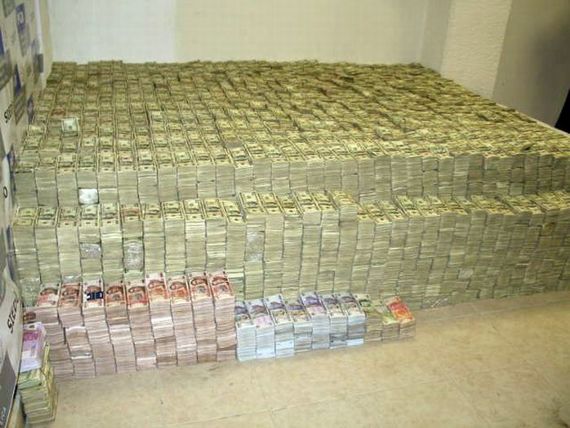U.S. Banks Picking Mexican Drug Cartels’ Side In The U.S.’s War On Drugs
May 19th, 2011
May 19th, 2011

Tim Bonnemann/Flickr*
If I told you that while the United States is engaged in a costly war against illegal drugs and the vicious cartels that traffic them, U.S. banks are willfully flouting U.S. and Mexican laws and helping these cartels launder their money, would you believe me?
For decades the U.S. has served as a safe haven for the ill-gotten finances of corrupt foreign leaders and their ilk. Former foreign government ministers, military leaders, and corrupt heads of state have mansions, businesses, and bank accounts here. The banks who facilitate much of these activities are required by law to conduct “due diligence” in determining the source of funds for these “politically exposed persons,” but compliance is spotty.
A recent scandal involves Wachovia, now owned by Wells Fargo, in which Wachovia was found to have laundered (and profited off said-laundering) $378.4 billion in drug money for Mexican drug cartels. It is just the most recent in a string of examples of the onerous dynamic between U.S. banks and Mexico’s criminal element.
In a letter dated February 9th, 2009, Mexican Finance Secretary Agustin Carstens makes the case to U.S. Treasury Secretary Timothy Geithner for automatic exchange of banking information between the two countries:
In continuing these efforts, both fiscal and law enforcement, I believe that one of the key elements of information that Mexico and the United States should begin sharing is the one pertaining to interest paid by banks of one country to residents of the other. Either because some of our taxpayers are simply moved by a tax avoidance motive, or more dangerously, criminals want to hide in one of our countries the cash they obtained from illicit sources in the other, both find a way to achieve their goal simply by opening bank accounts in the other countries’ banks. Moreover, due to the fact that the United States does not tax interest income paid by banks to non-resident aliens, and both countries do not have a solid and reliable mechanism to verify the actual residence of foreign depositors, we simply are allowing both the tax avoiders and the criminals to move their money untaxed and benefit from it. As you are aware, Mexico and the United States regularly exchange information, on a case-by-case basis, in accordance to our bilateral Tax Treaty. We also exchange bulk information on interest payments (between corporations), dividends and royalties. However, we do not exchange information on interests paid by banks from one country to residents of the other country. Canada and the US implemented such mechanism years ago, Mexico and Canada began exchanging such information years ago as well. Being the world’s largest trading block under the NAFTA, and fighting considerably higher security threats than a decade ago, I truly believe that we should enhance our cooperation and strengthen our capacities to protect our peoples and wealth. The exchange of information on interest paid by banks will certainly provide us with a powerful tool to detect, prevent and combat tax evasion, money laundering, terrorist financing, drug trafficking and organized crime.
A quote by Jeffrey Sloman, the federal prosecutor in charge of the Wachovia case, sums up the bank-criminal dynamic nicely: “Wachovia’s blatant disregard for our banking laws gave international cocaine cartels a virtual carte blanche to finance their operations.”
Wachovia’s punishment for all of this bad behavior? A forfeiture payment to the federal authorities of $110 million and a $50 million fine—a miniscule amount in comparison to the $420 billion they allowed to pass through their bank without subjecting it to money laundering controls, or to their $12.3 billion profit for the year 2009. And nobody went to jail for this, not even the executives who ignored the whistle blowing efforts of certain courageous employees concerned about the lack of AML controls in place, going so far as to fire one of them for speaking out.
In addition to Wachovia, Bank of America, HSBC, Citigroup, Bank of Credit and Commerce International, and American Express Bank International have all had their own recent money-laundering scandals. Despite the high profile nature of many of these scandals, prosecutions under the Bank Secrecy Act or other federal laws remain scarce. The Justice Department has instead dealt with these sorts of situations through the use of deferred-prosecution agreements and fines, such as the one Wachovia was subject to.
This may change soon. The U.S. Treasury has recently proposed a rule known by insiders as the “Reporting on Non-Resident Alien Accounts” rule, which would require banks to provide the U.S. government with information on all non-U.S. person account holders similar to information provided by U.S. citizen/resident taxpayers on a 1099 form. (The U.S. government does not currently collect this information so they have no idea how much money is held in U.S. banks by foreigners, nor do they have any idea who those foreigners might be. This means that terrorists could be hiding their money in the U.S., and we could be missing a terror threat right under our noses.) You thought finding Osama bin Laden was hard? Imagine trying to track his and al-Qaeda’s money through shell companies, subsidiaries, and false names when U.S. banks don’t even know for whom law enforcement is looking, or worse, when U.S. banks are looking the other way and allowing criminal money to flow willfully through our financial system. The benefits of this new rule should be obvious – the U.S. will stop shooting itself in the foot when it comes to fighting terrorism and drug trafficking.
* Image license: Some rights reserved by planspark